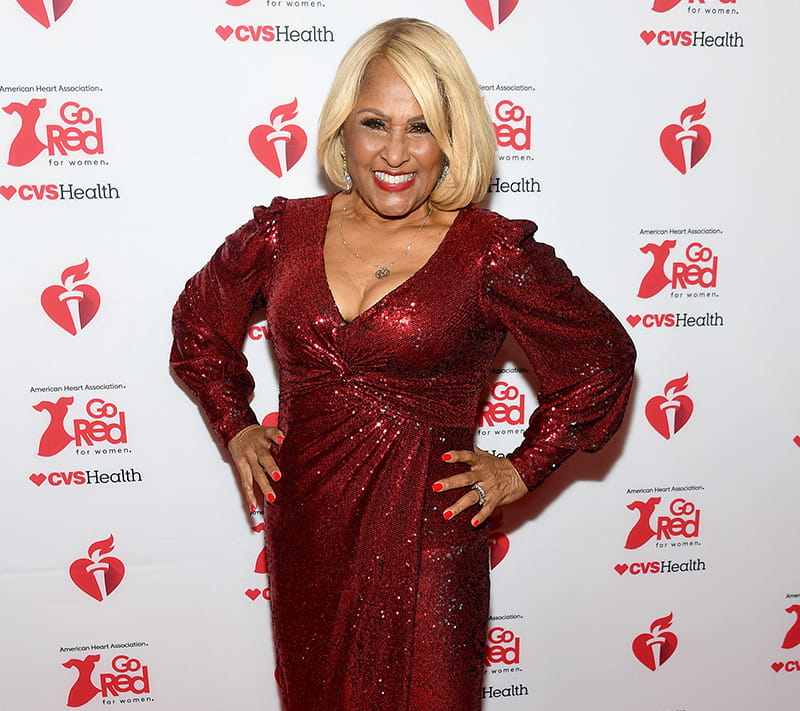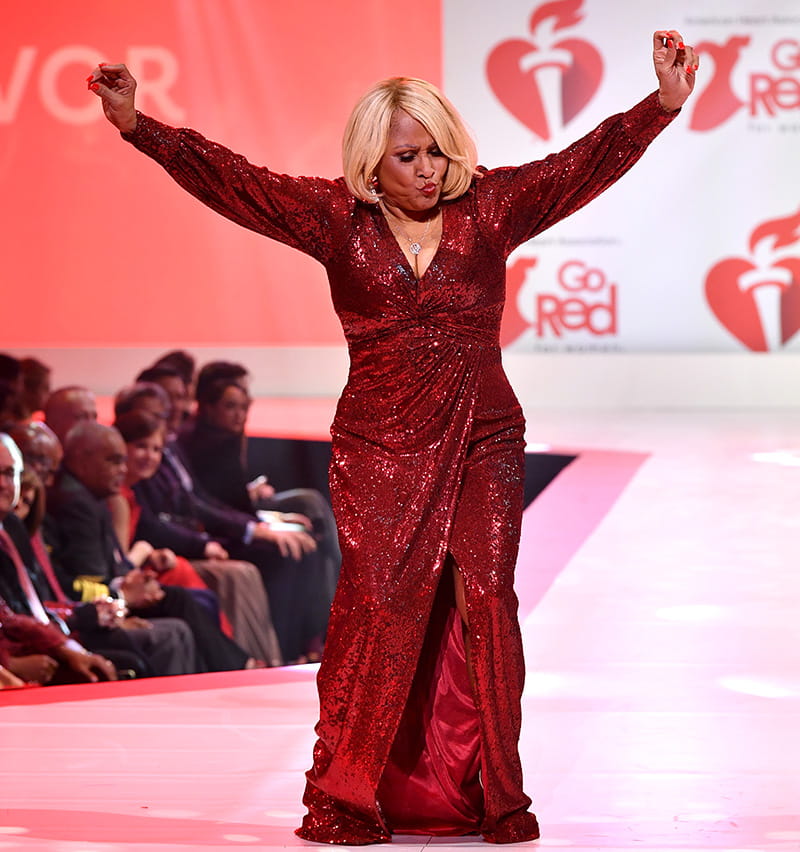She’s a Rock & Roll Hall of Famer – and she’s finally revealing her heart story
By Nancy Brown, American Heart Association CEO

In 2011, Darlene Love was inducted into the Rock & Roll Hall of Fame, the golden voice behind "He's A Rebel" and "Christmas (Baby Please Come Home)" given her rightful spot in music history.
In 2014, Darlene was on stage at the Academy Awards as "20 Feet From Stardom" – a movie about talented, often-overshadowed backup singers such as her – received the Oscar for best documentary feature.
In between, there was another noteworthy event: A heart attack. The day of a show. A show she nonetheless performed without anyone noticing her compromised health.
If it doesn't sound familiar, that's because it's hardly been publicized. Her manager said it could be bad for her career.
Darlene shared details with loved ones and even performed at some small benefits for heart-related causes. It always bothered her, though, to withhold her tale from the masses. She thought talking about it might prompt someone to get help more quickly if something similar happened. She especially felt guilty every February when she watched the Go Red for Women Red Dress Collection fashion show hosted by my organization, the American Heart Association. She even imagined herself taking part in the event.
Well, as the picture atop this story shows, Darlene has flipped the narrative.
Last week, she was among the 28 celebrities prowling the catwalk in New York. And now, for the first time, she's sharing the details of her heart story – the family history and personal vices that may have caught up to her, how that fateful day played out, and the changes she's made.
As we continue to celebrate American Heart Month in this space, it's my pleasure to share another tale packed with important, powerful takeaway messages.

From her youth, Darlene knew she carried a key risk factor for heart disease: a family history.
It started one Sunday when her dad – an athletic man who seemed to be in great shape – came home from preaching at church complaining of pain in his chest and left arm.
"He put on his pajamas, got in bed and died," Darlene said. "He was 60. So all of us – my three brothers and a sister – we always said, 'Let us pass 60!'"
Five years later, her mom suffered a heart attack. She recovered to live another 20 years. As time went on, that family history became "a fleeting memory" to Darlene, especially once she passed 60 and was still going strong.
Health has always been a priority for her.
She exercised along to The Jack LaLanne Show as a teenager, then to Jane Fonda videotapes in the 1980s and '90s. In recent years, she could be found kickboxing at 5 a.m. most mornings.
No wonder she had the stamina to perform eight shows a week on Broadway and, she proudly notes, the only time she called in sick was when the doctor said her vocal cords needed some rest.
"Plus," Darlene said, laughing, "I have a doctor who gets me every kind of test you can think about."
***
Whenever Darlene performs on the New Jersey shore, she and her husband Alton Allison like to make a weekend out of it.
They were there one Saturday in 2012 when she woke up with a headache and stomachache. The digestive problems worsened, surpassing anything she'd ever experienced.
"Why won't it go away this time?" she wondered.
She never thought about seeing a doctor. Her focus was getting well enough to sing.
That evening, Alton drove to the show with Darlene resting in the back seat. He called the theater to warn them about her poor health, then stopped at a convenience store. She expected he was getting more medicine for her nausea and diarrhea. Instead, he bought aspirin and told her to chew it.
She thought it was strange, but his insistence persuaded her to go along. Within five minutes, her stomach was settled. Soon she was on stage for her usual 90-minute concert.
"I came off, signed autographs, took pictures and thought everything was great," she said. "The next morning, my husband said we should probably go to the doctor just to see what that was."
It would be about a year before Alton admitted that he feared she was having a heart attack.
***
Darlene followed up with the doctor she'd had for over 30 years. Among the reasons she'd stayed with him was his sense of humor.
Only now – as he looked over test results, heard her symptoms and factored in her family history – he spoke with a new intensity as he urged her to see the cardiologist next door.
Following a treadmill stress test, the cardiologist said: "Tell your husband to take you home, get some clothes and meet me at the hospital at 10. I'll be operating at 12."
"But I'm not in pain," she protested.
"Darlene," he said, "your artery is nearly 90% clogged."
***
She thought of her father.
Then she thought of those who loved her as much as she loved him. She called her three sons, her pastors and her best friend. She said they could pass the news to anyone who wouldn't get hysterical and would instead pray for her.
She arrived at the hospital expecting to undergo open heart surgery. To her relief, doctors planned to insert a catheter near her groin and snake that to her heart, where two stents would be inserted to prop open her clogged arteries.
"Do you want to watch?" she was asked.
"I'll be praying," she said. "You do your job and I'll do mine."
She went home on her 71st birthday.

In the long and colorful history of legendary musicians and their vices, Darlene's are quite tame.
Like nearly all her peers in the 1960s and '70s, she smoked cigarettes. She struggled to kick the habit in the 1980s. Then one day she said: "Lord, I can't do it myself. I need help." It worked.
She also was a candy junkie. Alton worked for a grocery store and would bring her home boxes of 24. They didn't last long. She remembers her pregnancies based on her candy cravings.
"I could have two at the same time," she said.
Before her heart attack, she performed regularly at a Broadway theater irresistibly close to a coffee shop. She got hooked on caramel macchiatos.
"But I never had problems with my weight, so I always thought I was healthy," she said. "My doctor said, `You either have a heart attack and die, or you have a heart attack and live.' I'm so grateful to be on the living side."
***
She's certainly lived quite a life.
The New York Times once hailed, "Darlene Love's thunderbolt voice is as embedded in the history of rock and roll as Eric Clapton's guitar or Bob Dylan's lyrics." Beyond her timeless hits of the 1960s, she's remained connected to younger audiences through movies, Broadway and 28 straight Christmastime appearances on David Letterman's show. She flew to the Red Dress Collection from Canada, where she was acting in the upcoming Netflix movie "Christmas Chronicles 2."
Then again, the title of the Oscar-winning documentary was "20 Feet from Stardom."
Among the obstacles she's faced: suing producer Phil Spector to get paid for songs from the 1960s, working as a housekeeper in Beverly Hills when a solo career failed to gain traction, then taking gigs on a cruise ship to relaunch her act.
So when her manager insisted on keeping quiet about her heart story, she allowed herself to be talked into it.
***
Darlene charged into her cardiac rehabilitation with the gusto that fueled her career.
Her already solid diet became great. She kicked the candy habit, traded caramel macchiatos for more water and opted against things like butter on her popcorn. She got checkups regularly: every three months, then every six, now annually. She's begun taking medicine to control her cholesterol.
"I do whatever my doctor says," she said. "Just like I obeyed my husband that night and took the aspirin. I want to do whatever I can to make sure I don't have another heart attack."
She also returned to the kickboxing classes taught by a woman who is such a close friend that Darlene calls her "my daughter."
"She didn't let me go until I had a letter from my doctor!" Darlene said. "She was not kidding. I had to bring in a note with his heading on it."
***
Darlene's heart story is unique because she didn't have the typical warning signs for women.
That also makes it more important to share.
While her episode had a happy ending, she encourages others not to take the same risks. When your body is sending signs that something's not right, get help right away.
"I'm telling you, it's different for everybody," she said. "The doctor said, `You know your body better than anybody.' You're the one who knows if you're having aches and pains. You've got to take care of your body to make it last.
"I just feel very blessed that I'm still here and able to talk about it."
A version of this story appeared on Thrive Global.
If you have questions or comments about this story, please email [email protected].





